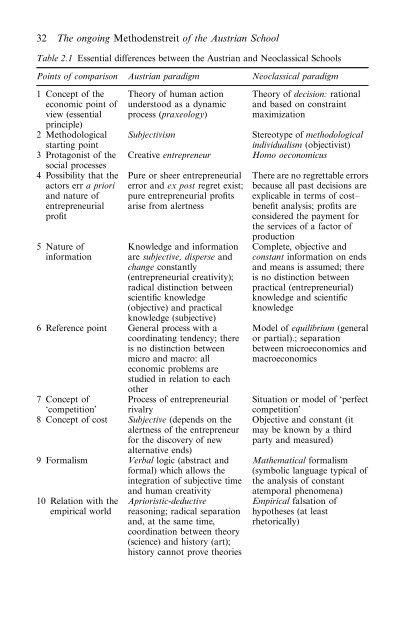1 The theory of dynamic efficiency
1 The theory of dynamic efficiency
1 The theory of dynamic efficiency
You also want an ePaper? Increase the reach of your titles
YUMPU automatically turns print PDFs into web optimized ePapers that Google loves.
32 <strong>The</strong> ongoing Methodenstreit <strong>of</strong> the Austrian School<br />
Table 2.1 Essential differences between the Austrian and Neoclassical Schools<br />
Points <strong>of</strong> comparison Austrian paradigm Neoclassical paradigm<br />
1 Concept <strong>of</strong> the<br />
economic point <strong>of</strong><br />
view (essential<br />
principle)<br />
2 Methodological<br />
starting point<br />
3 Protagonist <strong>of</strong> the<br />
social processes<br />
4 Possibility that the<br />
actors err a priori<br />
and nature <strong>of</strong><br />
entrepreneurial<br />
pr<strong>of</strong>it<br />
5 Nature <strong>of</strong><br />
information<br />
<strong>The</strong>ory <strong>of</strong> human action<br />
understood as a <strong>dynamic</strong><br />
process (praxeology)<br />
Subjectivism<br />
Creative entrepreneur<br />
Pure or sheer entrepreneurial<br />
error and ex post regret exist;<br />
pure entrepreneurial pr<strong>of</strong>its<br />
arise from alertness<br />
Knowledge and information<br />
are subjective, disperse and<br />
change constantly<br />
(entrepreneurial creativity);<br />
radical distinction between<br />
scientific knowledge<br />
(objective) and practical<br />
knowledge (subjective)<br />
6 Reference point General process with a<br />
coordinating tendency; there<br />
is no distinction between<br />
micro and macro: all<br />
economic problems are<br />
studied in relation to each<br />
other<br />
7 Concept <strong>of</strong> Process <strong>of</strong> entrepreneurial<br />
‘competition’ rivalry<br />
8 Concept <strong>of</strong> cost Subjective (depends on the<br />
alertness <strong>of</strong> the entrepreneur<br />
for the discovery <strong>of</strong> new<br />
alternative ends)<br />
9 Formalism Verbal logic (abstract and<br />
formal) which allows the<br />
integration <strong>of</strong> subjective time<br />
and human creativity<br />
10 Relation with the<br />
empirical world<br />
Aprioristic-deductive<br />
reasoning; radical separation<br />
and, at the same time,<br />
coordination between <strong>theory</strong><br />
(science) and history (art);<br />
history cannot prove theories<br />
<strong>The</strong>ory <strong>of</strong> decision: rational<br />
and based on constraint<br />
maximization<br />
Stereotype <strong>of</strong> methodological<br />
individualism (objectivist)<br />
Homo oeconomicus<br />
<strong>The</strong>re are no regrettable errors<br />
because all past decisions are<br />
explicable in terms <strong>of</strong> cost–<br />
benefit analysis; pr<strong>of</strong>its are<br />
considered the payment for<br />
the services <strong>of</strong> a factor <strong>of</strong><br />
production<br />
Complete, objective and<br />
constant information on ends<br />
and means is assumed; there<br />
is no distinction between<br />
practical (entrepreneurial)<br />
knowledge and scientific<br />
knowledge<br />
Model <strong>of</strong> equilibrium (general<br />
or partial).; separation<br />
between microeconomics and<br />
macroeconomics<br />
Situation or model <strong>of</strong> ‘perfect<br />
competition’<br />
Objective and constant (it<br />
may be known by a third<br />
party and measured)<br />
Mathematical formalism<br />
(symbolic language typical <strong>of</strong><br />
the analysis <strong>of</strong> constant<br />
atemporal phenomena)<br />
Empirical falsation <strong>of</strong><br />
hypotheses (at least<br />
rhetorically)

















